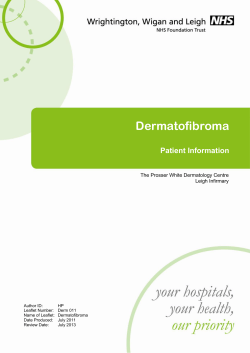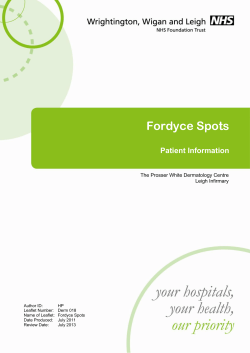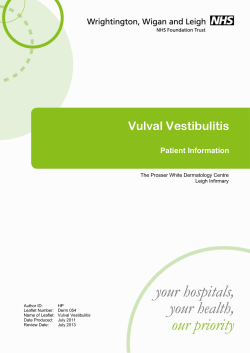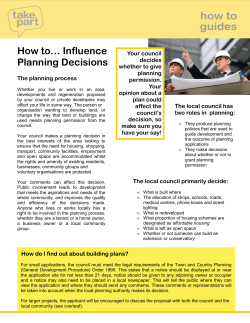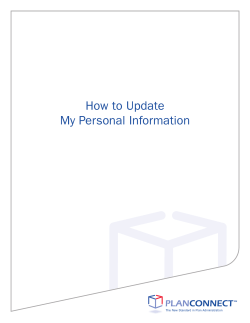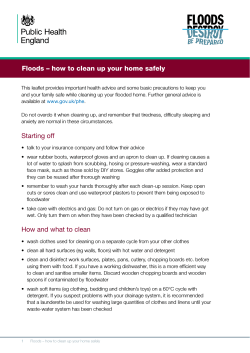
Create and own your own online Health Care Record. To here............
Create and own your own online Health Care Record. How to get from here .......... To here............ David Sandbach Shropshirecares@aol.com Page 1 Introduction: This booklet has been written to help you take control of your own Health Care Records. By sharing this information the team at Shropshire Cares Info Central hope you will benefit from being able to access your health records 24 / 7 from anywhere in the world. We think people can use their personal health care records to help them engage in a harmonious and safe way with health professionals and social care organisations. We trust you are of a like mind and we hope you are able to take the opportunity to use “information technology” to help you access your health care record as and when you need to make decisions about your health care. Why hold and control your own Health Care Records? A lot of people in the UK think that information about their health care is stored on a central computer somewhere and can be made available as and when the need arises, across all the different organisations concerned with providing health care to an individual. In reality UK citizens are a very long way off from having anything like a fully connected 24 / 7 online information facility which can allow clinical staff and individual citizens’ access to all their Health Care Records. The list below details the kind of organisations that may have personal care information about you on their corporate computer system – be warned these organisations work in silo information system mode – very few systems if any communicate with each other. Information silos include: GP. General Hospital. Specialist Hospital. Mental Health Service. Community Nursing Service. Dentist. Pharmacist. Opticians. Social Services. Prison Service. Private health care providers e.g. hospitals, therapists, chiropodists etc. Private Care Homes. RAMC etc. (Armed Services) Overseas health providers. 2 David Sandbach Shropshirecares@aol.com August 2012. Unfortunately the information “silo” systems we are all subjected to means that people who are trying to help you are at risk of making decisions about you in ignorance of what other professionals have done when caring for you recently or at sometime in the past. This is not a good position to be in if you can avoid it. Listen to what Dame Fiona Caldicott has to say on the subject: “As doctors, all of us have awareness of harm done to our own patient or a colleague's because information was not shared with others involved in their care. The reluctance to share appears particularly strong across the boundaries of health and social care organisations, including independent sector providers.” Dame Fiona Caldicott | 27th April 2012 Source: Pulse – ‘Whether you love it or hate it information sharing is here to stay.’ 3 David Sandbach Shropshirecares@aol.com August 2012. Hippocratic Oath. “I will prescribe regimens for the good of my patients according to my ability and my judgment and never do harm to anyone” If you create your own online health care record you will assist the clinicians responsible for your medical care to follow the Hippocratic Oath and help them to: Minimise delays in your treatment. Reduce chances of drug omissions, inappropriate drug regimes and prescription of wrong drugs which could harm you. Order the right investigations – repeat investigations can be harmful . Avoid over treatment or under treatment - right first time approach is in your best interest. 4 David Sandbach Shropshirecares@aol.com August 2012. NHS Constitution:You have the right of access to your own health records. These will always be used to manage your treatment in your best interests. (NHS Constitution. March 2012.) Royal College of General Practice: Patients should be given appropriate information and opportunities to exercise control over the healthcare decisions that affect them. Giving patients direct electronic access to their health records is one method of sharing relevant information to help them make informed decisions about their health care. Patients should be encouraged to access their own health records and use them to improve their health and care. Record Access for patients is likely to improve their care and their safety. Where Record Access is implemented, it should be at no cost to the patient. RCGP:- Enabling Patient Access to records. If you want to start stacking the odds in your favour from a personal safety point of view and at the same time start taking a little more responsibility for your health and well being please read on. 5 David Sandbach Shropshirecares@aol.com August 2012. How to create your online Health Care Record. The task list for constructing an online Care Record is straight forward. Some people may need assistance e.g. people who are new to computers and the Internet and / or are less able or confident in asserting their rights when dealing with state funded authorities e.g. NHS Trusts, Local Authority Social Services Departments and authority figures such as GP’s. Task Comment Open a HealthVault Account. Populate with basic biographical and health data. Weight, Medications, Allergies, health history, past medical procedures, blood type, vital sign data e.g. blood pressure. Microsoft Health Vault. This is a free service provided by Microsoft. Easy to do - takes ten to twenty minutes. Contact your GP and ask for your medical records – this is called a Subject Access Request under the Data Protection Act rules and regulations. Subject Access Request. My GP provided me with my record on a CD for free in accordance with Royal College of General Practice guidance Royal College of General Practice Enabling Patient Access to their Records . Ask for the records in an electronic format i.e. on a disk so that you can down load the information from a disc directly onto your computer. In the event that a GP practice cannot supply data on a disc then paper copies can be supplied. These documents can be scanned into your own computer for down loading into HealthVault. Copy the file from your computer hard drive into your Health Vault documents storage area for access on an “anywhere / any time” basis. The medical practice I go to uses an EMIS software system. This is a tedious method for data transfer but it is doable if necessary. 6 David Sandbach Shropshirecares@aol.com August 2012. Task. Comment. Contact Acute Hospital / Community Care Trust or other Health or Social Care providers you may have been involved with and ask for your medical or Social Care records. In my case I only needed to approach one organisation for my hospital records. When I made my request I asked only for those records held in an electronic format. The Hospital Trust I choose to use has around five or six computerised data capture systems. Remember you will need to make a separate Subject Access Request for each organisation that has had the privilege of helping you over the years. Quick overview of your rights. My local hospital Trust ‘Shrewsbury and Telford Hospitals NHS Trust’ responded that they could not burn my records to disc except for the X-Ray records. Like many NHS organisations they do not have the facilities to collect information held on their computer systems and down load the information to a CD. Consequently I asked for my records in paper format to scan into my lap top and upload to my HealthVault file. My paper records cost £50. In actual fact there were only 6 or 7 documents of any use to me since the important documents i.e. correspondence between consultant staff at the hospital and my GP was on the GP system and I had a copy of that information already. Top tip. Letters to your GP from hospital Consultants and therapists do not usually have the full written reports of any tests, X-rays or diagnostic procedures you may have had at the hospital. To keep your costs down only ask the hospital for the reports written as a result of you having had a procedures e.g. an endoscopy, colonoscopy or CT / MRI / Ultrasound scans or any X-rays you may have had. This will save you time and money. Alternatively if you know the date when you had a procedure / X-ray ask for your records pertaining to that specific date. NB: a lot of the hospital case note content can be illegible since they are often written in poor hand writing and are not worth having unless you intend to take legal proceedings against the hospital. Please see Appendix A to see how to organise your hospital notes. Please see Appendix B to see other types of information you may want to keep as part of your Health Care Records. 7 David Sandbach Shropshirecares@aol.com August 2012. Task. Comment. Keep your records up dated. At the moment I do this by asking for information each time I interact with my health care providers. For example after I loaded my GP records into my Health Vault storage area I had an appointment to see the practice nurse for my annual check up. My GP record was changed at that point in time so I asked for a paper print out to scan into the GP section of my care records. I intend asking for the disc I obtained originally to be up dated every now and then e.g. when I next attend for my annual check up. One day I expect to link my GP records to my HealthVault storage area with one click on a button! Top tip. If you feel clinicians are wary about you seeing information concerning your care you may wish to remind them of government policy contained in this good practice guidance issued in 2002. Copying letters to patients’ good practice guide lines. This policy is also part of the NHS Constitution page 4. In reality your GP practice is very likely to be more than happy that you are keeping your Health Records all in one place. By taking such an approach to your health it is a lot easier to have a mature “joint care” approach to keeping you healthy – you benefit and so does the GP. 8 David Sandbach Shropshirecares@aol.com August 2012. Appendix A. Below is an example of how to structure a set of hospital records. The trick is to file you documents in date order and by each hospital clinical specialty. This approach mimics the way a doctor would see your hospital paper records when seeing you in hospital. Summary Hospital Clinical Notes: Your name: Your date of birth: Your NHS number: Content: 1. Medical & Gastroenterology. 2. Surgical. 3. Orthopaedic. 4. Urology. 5. Dermatology. 6. Accident & Emergency. 7. Therapy Services e.g. Physiotherapy. 8. Miscellaneous & Bowel Cancer Screening. NB If you use or have used more than one hospital please can you make sure that this is noted on the front page e.g. “4. Urology: 4 A Hospital A - all documents from hospital A filed under 4A 4 B Hospital B - all documents from hospital B filed under 4B” 9 David Sandbach Shropshirecares@aol.com August 2012. Appendix B. The list below shows the additional items an individual may want to store in their Health Vault alongside their Health Care Records: Decision support sites Lasting Power of Attorney Advanced Directive A picture of Health Decision support sites: Your GP is your best guide and mentor should you get sick and / or need professional medical advice, treatment and care. There will of course be times when you want to weigh up your options – different people will do this in different ways. Below is a selection of decision support sites we know one member of the Shropshire Cares Info Central team has loaded up into a Health Vault facility. Decision support sites: NHS Choices. http://www.nhs.uk/Pages/HomePage.aspx National Institute for Clinical Excellence. http://pathways.nice.org.uk/ Electronic Medicines Compendium (eMC). http://www.medicines.org.uk/EMC/about.aspx Cochrane Library. http://www.thecochranelibrary.com/view/0/index.html Medical Abbreviations and dictionary. http://www.medilexicon.com/ See what your Doctor sees on the Map of Medicine? http://healthguides.mapofmedicine.com/choices/map/index.html Self care library. http://selfcare-library.info/ Understanding RISK. http://besthealth.bmj.com/x/static/514521/decision-support.html Understanding your lab test results. http://www.labtestsonline.org.uk/understanding/ 10 David Sandbach Shropshirecares@aol.com August 2012. Other sites which may help the decision making process. SHROPSHIRE CARES INFO CENTRAL. http://www.2shrop.net/Shropshirecaresinfocentral Getting the Most from your Doctor’s appointment. http://www.nhs.uk/Planners/Yourhealth/Pages/Appointment.aspx and http://www.dh.gov.uk/prod_consum_dh/groups/dh_digitalassets/@dh/@en/documents/digitalasset/dh_079 521.pdf On line Health Resources. http://www.2shrop.net/2shropnet/AToZOfMinisites/S/ShropshireCaresInfoCentral/YourHealth./OnlineHealthResources Weight Conversion. Kg. to Stones & lbs. http://www.occupationalhealth.co.uk/WeightConversion.htm Pain Chart. http://spic.co.uk/media/Clinical%20Nurse%20Advisor/Pain%20Ruler.docx Pain Management Tips. http://www.webmd.boots.com/pain-management/default.htm Patients like me. http://www.patientslikeme.com/ I Want Great Care. https://tht.iwantgreatcare.org/ People in research. http://www.peopleinresearch.org/ Patient UK. http://www.patient.co.uk/ NB. These resources represent the approach taken by male “early senior” (60+). People at different stages in their life cycle will elect to use different online resources to help in their health care decision making process. 11 David Sandbach Shropshirecares@aol.com August 2012. Lasting power of Attorney http://www.justice.gov.uk/forms/opg/lasting-power-of-attorney The completed form should be stored in the Health Vault files - scanned in with your hand written signature on them. The hard copy can be kept at home or stored at the Attorneys Office with your last will and testament. If you need to make medical personnel aware of these forms but are not in the UK you may find that they are not accepted due to different legal traditions and national customs in the country you are in. Advanced Directive. http://www.compassionindying.org.uk/story/advance-decisions-0 These forms are free and give a good transparent steer to people who may be making decisions about you in difficult and sensitive circumstances. The completed form should be stored in the Health Vault files scanned in with your hand written signature on them. The hard copy can be kept at home or stored at the Attorneys Office with ones last will and testament. A picture of Health A picture is worth a thousand words. This picture shows professionals and care workers what “health” looks like to an individual – me. This is a purely personal / emotional view of health. The image chosen will differ for each individual who chooses to provide an “image of health” picture as part of their Health Care Records. 12 David Sandbach Shropshirecares@aol.com August 2012. The document storage facility in Health Vault can also be used to provide a pictorial history of a disease / wound progression or general physical deterioration in a person over time. A skin condition for example. It could also could be used to insert video clips for future reference e.g. showing mobility capacity or as an audio visual record of mental capacity e.g. in cases of dementia which could include inputs form a carers point of view. 13 David Sandbach Shropshirecares@aol.com August 2012. Other booklets in the series:- How to use your online Care Records as the family Chief Medical Officer. How to use your online Care Records in an emergency. How to use your online Care Records to manage long term conditions. How to use your online Care Records to co-ordinate your integrated care team. How to use your online Care Records to manage your pregnancy. How to use your online Care Records to support Healthy Ageing. How to use your online Care Records if you are homeless. How to use your online Care Records when you want to give something back. How to use your online Care Records when you are away from home, abroad, on an expedition or at sea. How to use your online Care Records when the hospital you are attending mislay your case notes. This booklet has been written by the team at Shropshire Cares Info Central and is provided as part of an ongoing commitment to Community Health and Well Being and social solidarity in county of Shropshire. Email: shropshirecares@aol.com 14 David Sandbach Shropshirecares@aol.com August 2012.
© Copyright 2025


